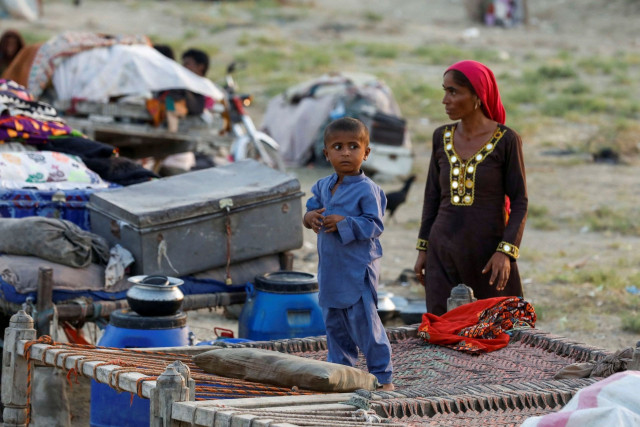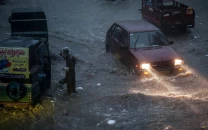No home, no vote: Flood victims far removed from polling process
Displaced affectees with missing CNIC’s will be unable to cast their votes in the upcoming elections

As parties and patrons remain engrossed in their campaigning drives for the upcoming General Elections 2024, many seem to have forgotten that the multitudes of displaced flood victims spread across the country, with devastated homes and lost identification documents, are also eligible voters.
Abdul Jabbar, a resident of a village located in Larkana had his house completely destroyed during the heavy rainfall and massive flooding in 2022. “Our home has still not been reconstructed, and my family continues to be displaced. Therefore, we cannot cast in our votes in the elections,” shared Jabbar, who was still awaiting the financial assistance announced by the last PPP government.
Similar to Jabbar, Gulab Jamali, another flood victim from the katcha area of Larkana, revealed that all of his family members had lost their CNIC’s during the flooding. “All our belongings including major identification documents were swept away by the flood water,” bemoaned Jamali, who could not obtain a new CNIC since the NADRA center was located far away from his village.
“Almost 10 to 15 percent of the flood affected population will be unable to cast their votes in the forthcoming elections since they do not possess their CNICs, which were misplaced during the floods,” validated Rehmatullah Buriro, an analyst and social worker based in Sukkur.
According to a recent survey conducted by the Center for Peace and Development Initiatives, in the aftermath of the 2022 floods in Khairpur and Naushahro Feroze, which witnessed the displacement of 1,500,000 people and the destruction of over 400,000 houses and a road network spanning 1349 kilometers, many flood affected families have still not been able to return to their native areas, where their votes are registered.
Since polling stations are usually set up in government schools and at least 40 percent of the government school buildings in Sindh have been damaged as a result of the floods, it is evident that the polling process will be downsized in flood affected areas. Even though, the current caretaker government has released funds worth Rs3.3 billion last December to repair the buildings of 9901 schools in the province, the state of the road network is such that it will be difficult for the voters of the affected areas to reach the polling stations on time.
Naseer Memon, a renowned columnist and social activist, after a recent visit to the flood affected areas, confirmed that it will be difficult for the voters to access the polling stations due to the destruction of the road network.
“A large number of people have still not been able to recover from the catastrophe even after the passage of 18 months. Many families are still displaced from their homes. The damaged road network in the affected areas is yet to be restored. The effects of this situation will be seen in the upcoming elections on February 8th,” seconded Riaz Sohail, a senior journalist, while speaking to The Express Tribune.
Published in The Express Tribune, February 5th, 2024.



















COMMENTS
Comments are moderated and generally will be posted if they are on-topic and not abusive.
For more information, please see our Comments FAQ